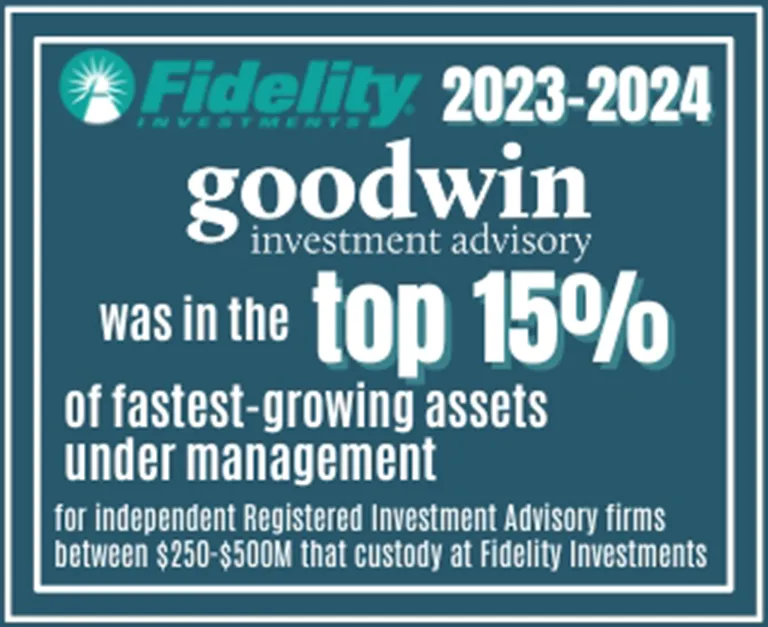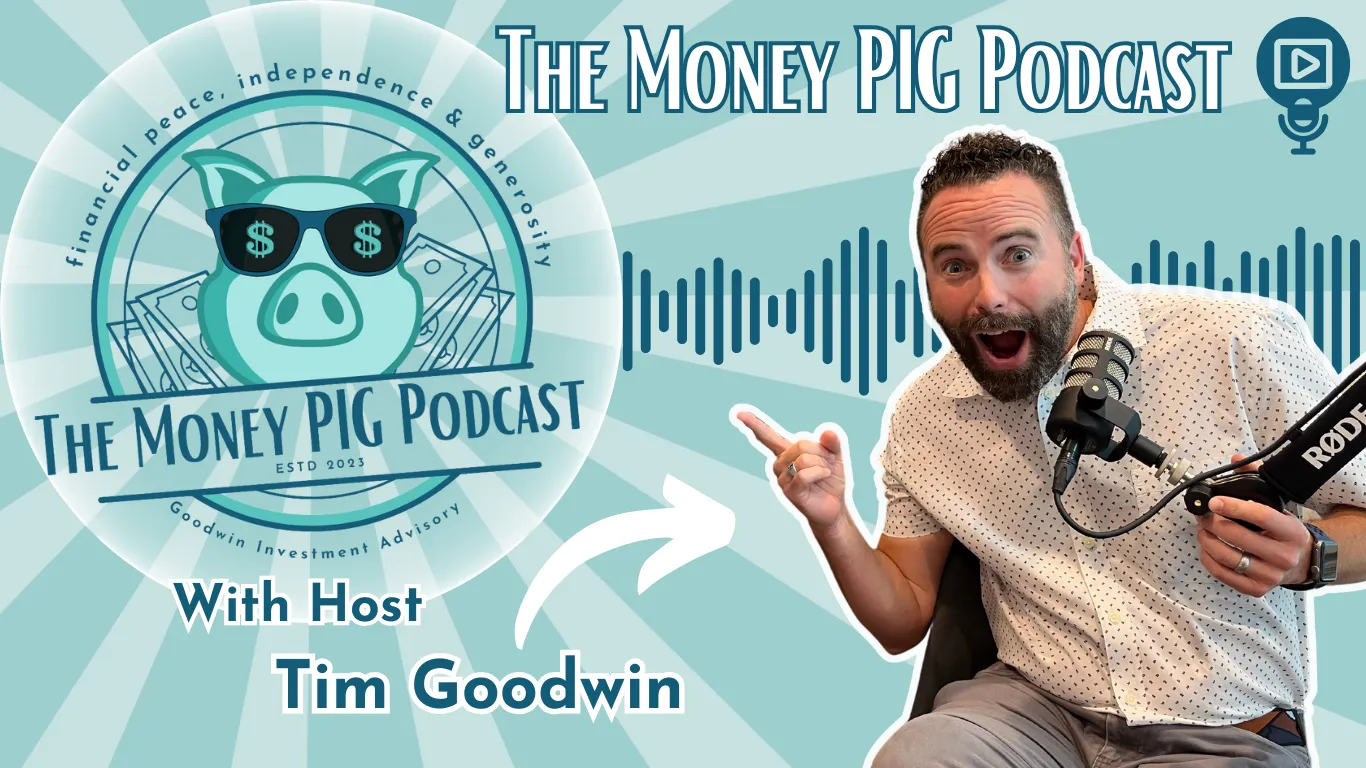get clarity
clear guidance on what you need to know
actionable advice
create a personalized action plan for your retirement
gain confidence
partner with an expert to invest wisely and secure your financial future



Disclosure: Goodwin Investment Advisory, LLC is an SEC registered Investment Adviser. The Google ratings, client satisfaction ratings and reference on The Ramsey Show were given by current clients, and were not compensated with cash, or non-cash compensation. There are no material conflicts of interest on the part of the person(s) giving the ratings and references resulting from the person’s relationship with Goodwin Investment Advisory, therefore has no incentive to recommend the adviser. Please click here for further information.
let us guide you

Guidance as you design your ideal retirement
We know that with retirement comes new possibilities as well as financial anxiety. Our team is here to help you every step of the way as you design, transition to, and live the retirement you envision.
Throughout the process, we will help you with as many unknowns and uncertainties as possible while supporting your plans, keeping you on track, and celebrating your milestones along the way.
You don’t have to do this alone as we provide guidance with financial planning, growing and protecting your wealth, minimizing the impact of taxes, and helping you to confidently reach your unique retirement goals.
* latest 10 reviews as of October 2025
Goodwin Investment Advisory, LLC is an SEC Registered Investment Adviser. SEC registration does not imply a certain level of skill or training. GIA did not provide any cash or non-cash compensation in return for these reviews, testimonials, and endorsements by existing clients and other individuals. We are also unaware of any material conflicts of interest on the part of the person(s) giving the testimonial or endorsement resulting from the person’s relationship with Goodwin Investment Advisory, which could result in an incentive to recommend the adviser. Some existing clients may be extended family members of employees or business partners; they have not been paid or otherwise compensated for the testimonial. Opinions and comments given by GIA clients or other individuals may not represent any other person’s experience with the firm.
your advisors




how to hire us

schedule your consultation
Contact Goodwin Investment Advisory today to schedule your complimentary introductory consultation. This is your first step towards personalized financial planning and investment management.

develop your strategy
Together with your CFP®advisor, we will assess your financial situation, discuss your goals, and craft a tailored investment strategy that aligns with your aspirations and risk tolerance.

achieve financial success
Implement your personalized investment plan and begin making your financial goals a reality. Enjoy the peace of mind and security that comes from having clarity about your financial future.
a free guide just for you
Feeling stressed about your financial future or want to learn ways to confidently meet your retirement goals?
How to create sustainable income for life? What goals do you need to plan for and check-off your list this year? How to find your right-fit advisor? How to plan for your happy retirement?
Trust Goodwin Investment Advisory in Woodstock, GA for your retirement and financial planning needs.
Better together
We understand that uncertainty about your financial future can be stressful, and it can be challenging to find an experienced financial advisor to trust with your retirement plan.
It should be simple, right?
You want someone who will listen to your concerns and individual goals, and who will partner with you and guide you along your journey.
At Goodwin Investment Advisory, we believe everyone deserves a secure financial future. We consistently see how a lack of comprehensive planning often leads to individuals feeling overwhelmed and uncertain, so we step in to offer personalized and strategic financial advice. Clients who have trusted us feel they are empowered with confidence when we partner together to navigate a clear path toward a meaningful retirement.

Welcome to The Money P.I.G. Podcast
Now in Video Format on YouTube!
The Money P.I.G. Podcast is hosted by Tim Goodwin, Founder + CEO of Goodwin Investment Advisory. Our mission is to lead people to financial Peace, Independence, and Generosity—hence the name PIG. You can now watch the podcast on YouTube or listen on Buzzsprout. Follow us to stay connected and never miss an episode!

*don’t worry, we won’t share your information
get your e-book
client stories
Disclosure: The client experience stories are considered an “Endorsement” by the SEC and are intended to provide a narrated example of the services and solutions provided by Goodwin Investment Advisory to its clients. The endorsement is provided by an actual client of Goodwin Investment Advisory. The storylines illustrate real-life scenarios and challenges that our clients face and how we can serve as your investment and planning guide. Our firm does not compensate our clients for endorsements, nor do we believe there are any reportable conflicts of interest between the client and the firm with this endorsement.
read our most recent blog, podcast episode, and client insider
FAQs
Trying to figure out if you have enough money to retire the way you want can be stressful. Our team of expert advisors can help you determine when the best time is for you to retire based on your circumstances and financial goals. Our advisors want to help you have confidence and security in your retirement plan so that you can retire when you’re ready with peace of mind that you can retire the way you want. If that is not possible, then your advisor can help you make a suitable plan that works for you.
Our fees are calculated based on your assets under management (AUM) with us, with a minimum of $1,875, quarterly. The overall effective rate decreases as the AUM increases, and the fees are typically taken directly from your investment accounts on a quarterly basis.
Under this model, you will have access to all of our services and team. To view our client advisory agreement, click here. To view our fees, click here.
The first step is to schedule an intro call.
Next, you will have a free consultation in our office. If you are local, we would love to meet with you in person, but we can accommodate you virtually if you prefer.
Thereafter, it is up to you if you want to schedule a second consultation to continue the conversation.
If you are ready to engage our firm, we will set up a meeting to sign the necessary documents and get you started on your journey as part of our client family!
On your introductory call, our consultant will ask you questions to get to know your story and financial goals.
If you want to prepare, the most thought provoking question you will be asked to answer is: “If we were meeting again 3-5 years from today, and you were looking back over time–what would need to happen to be happy with your financial progress?”
Our consultant will also ask you about your pain points, whether you have worked with a previous advisor, what success looks like when working with an advisor, any debt you might have, income streams, investments and your retirement plan. Our consultant will spend time addressing your questions and, if you request it, will set up a free follow-up consultation with one of our advisors.
- You lack confidence in your current financial plan and want to know what you don’t know to help remove uncertainty and bring security.
- Managing your assets has become increasingly stressful on your own.
- You are unhappy with your current advisor.
- You want to collaborate with a financial professional before making big financial decisions, such as deciding when to retire.
- You realize you have handled most (if not all) of your investments, and your spouse needs someone they trust and can turn to for help if they outlive you.
- You retire or change employers.
- You need help deciding when to take your Pension or if it’s better to take the lump sum payout.
- You want advice on a tax planning and minimization strategy when it comes to managing your investments.
- You have a large amount of cash, such as after selling property or a business.
- You receive a significant inheritance.
- You’ve probably heard the quote, “If you want to go fast, go alone. If you want to go far, go together.”
- Making decisions with a trusted financial advisor has proven time and time again to provide better outcomes than making decisions without a financial advisor.
- Please don’t take our word for it. Just search Google (or a different search engine if you prefer) with the phrase,
- How much higher are the returns for investors who work with a financial advisor?
- In a study done by Vanguard found that “advisors can potentially add 3% or more to a client’s net investment returns by picking cost-effective investments, behavioral coaching, and more.”
- You might be surprised to see how much faster investments can grow over time, with an annual 3% increase.
- Consider asking a friend who has hired a financial advisor why they hired one. And while you’re at it, check out our Google reviews online, where many of our clients shared why they hired us.






























